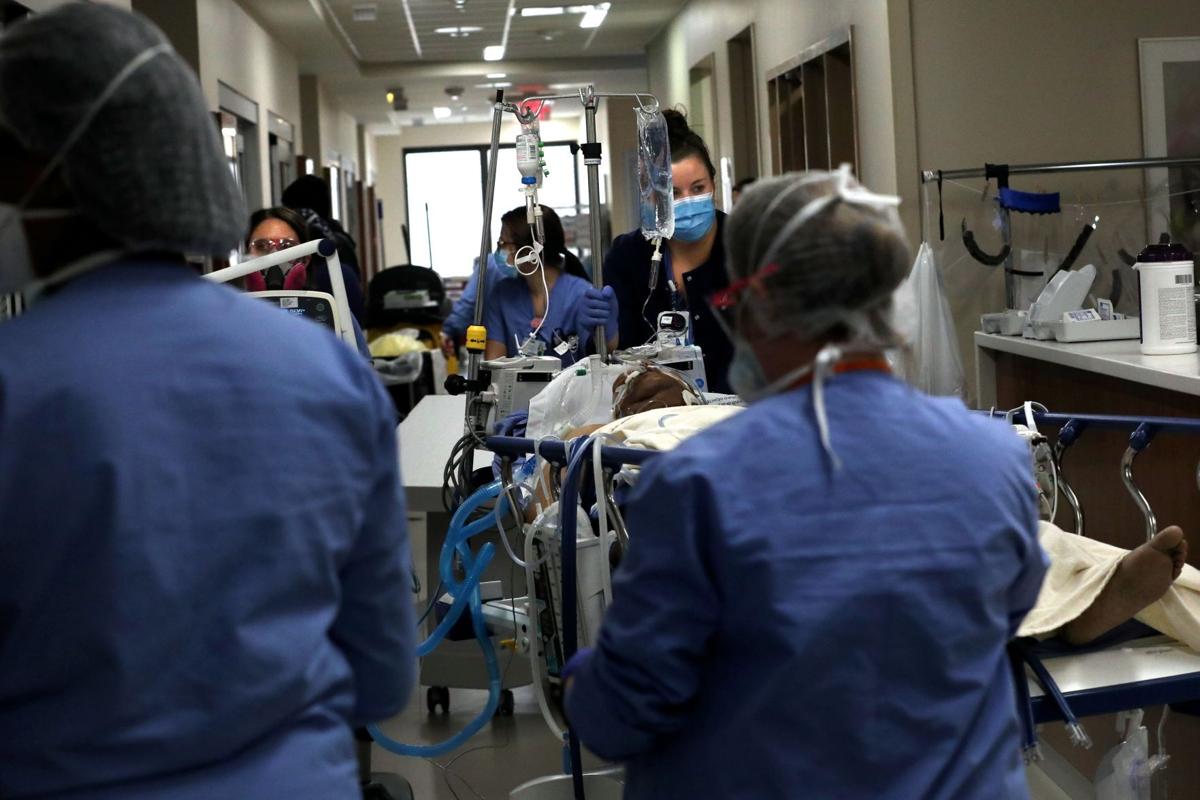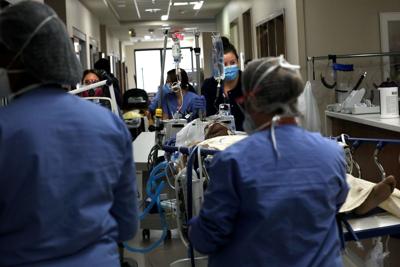ST. LOUIS ŌĆö Those who have had COVID-19 ŌĆö including those with mild cases ŌĆö have an increased risk of death in the six months following the diagnosis, according to research led by Washington University that is believed to be the largest comprehensive study yet on long-term complications related to the virus.
The study involved more than 87,000 COVID-19 patients and nearly 5 million control patients in a federal database. It was released .
The investigators showed that after the first 30 days of illness, COVID-19 survivors had an almost 60% increased risk of death over the following six months compared with the general population.
At the six-month mark, excess deaths among all COVID-19 survivors were estimated at eight people per 1,000 patients. Among those sick enough to be hospitalized with COVID-19 and who survived beyond the first 30 days of illness, there were 29 excess deaths per 1,000 patients over the following six months.
People are also reading…
ŌĆ£Our study demonstrates that up to six months after diagnosis, the risk of death following even a mild case of COVID-19 is not trivial and increases with disease severity,ŌĆØ said , assistant professor of medicine at the Washington University School of Medicine and senior author of the study. ŌĆ£It is not an exaggeration to say that long COVID-19 ŌĆö the long-term health consequences of COVID-19 ŌĆö is AmericaŌĆÖs next big health crisis.ŌĆØ
The researchers also catalogued numerous diseases associated with COVID-19, providing an overview of the long-term complications. With more than 30 million Americans having been infected with the coronavirus, the burden of the disease could be massive.
ŌĆ£The lingering effects of the disease will be felt for many years and even decades,ŌĆØ Al-Aly said.
As the COVID-19 pandemic progressed, it became clear that many survivors ŌĆö even those not sick enough to be hospitalized ŌĆö continued to experience health problems long after the initial infection.
First, there were accounts of issues such as breathing problems, irregular heart rhythms, hair loss and mental health struggles. Smaller studies confirmed the wide-ranging side effects, and symptoms became known as ŌĆ£.ŌĆØ
In the new study, the researchers were able to calculate the potential scale of the problems.
ŌĆ£This study differs from others that have looked at long COVID-19 because, rather than focusing on just the neurologic or cardiovascular complications, for example, we took a broad view and used the vast databases of the Veterans Health Administration to comprehensively catalog all diseases that may be attributable to COVID-19,ŌĆØ said Al-Aly, who also serves as chief of the Research and Education Service at the Veterans Affairs ėŻ╠ę╩ėŲĄ Health Care System.
The later deaths that researchers discovered were due to long-term complications of COVID-19 are not necessarily recorded as deaths to the virus.
ŌĆ£As far as total pandemic death toll, these numbers suggest that the deaths weŌĆÖre counting due to the immediate viral infection are only the tip of the iceberg,ŌĆØ Al-Aly said.
The research included 73,435 patients in the VA database with confirmed COVID-19 but who were not hospitalized, and compared them to almost 5 million VA patients who did not have a COVID-19 diagnosis and were not hospitalized during the same time frame. The researchers also conducted a separate analysis of 13,654 VA patients hospitalized with COVID-19 and compared them to 13,997 patients hospitalized with seasonal flu.
While 88% of the veterans in the study were men, the study still included a large sample size of 8,880 women with confirmed cases.
The researchers confirmed that long COVID-19 can affect nearly every organ system in the body:
ŌĆó Respiratory system: persistent cough, shortness of breath and low oxygen levels in the blood.
ŌĆó Nervous system: stroke, headaches, memory problems and problems with senses of taste and smell.
ŌĆó Mental health: anxiety, depression, sleep problems and substance abuse.
ŌĆó Metabolism: new onset of diabetes, obesity and high cholesterol.
ŌĆó Cardiovascular system: acute coronary disease, heart failure, heart palpitations and irregular heart rhythms.
ŌĆó Gastrointestinal system: constipation, diarrhea and acid reflux.
ŌĆó Kidney: acute kidney injury and chronic kidney disease that can, in severe cases, require dialysis.
ŌĆó Coagulation regulation: blood clots in the legs and lungs.
ŌĆó Skin: rash and hair loss.
ŌĆó Musculoskeletal system: joint pain and muscle weakness.
ŌĆó General health: malaise, fatigue and anemia.
Many patients developed a cluster of these issues that had a significant impact on health and quality of life, researchers found.
Among hospitalized patients, those who had COVID-19 fared considerably worse than those who had influenza, according to the analysis. COVID-19 survivors had a 50% increased risk of death compared with flu survivors and a higher risk of long-term medical problems.
The researchers also found that hospitalized patients who required intensive care were at the highest risk of long-term complications and death.
ŌĆ£Some of these problems may improve with time ŌĆö for example, shortness of breath and cough may get better ŌĆö and some problems may get worse,ŌĆØ Al-Aly said. ŌĆ£We will continue following these patients to help us understand the ongoing impacts of the virus beyond the first six months after infection.ŌĆØ
Helping with recovery
Many hospital and physician systems, including Washington University School of Medicine, have opened long COVID clinics to provide care unique to these patients.
ŌĆ£Physicians must be vigilant in evaluating people who have had COVID-19,ŌĆØ Al-Aly said. ŌĆ£These patients will need integrated, multidisciplinary care.ŌĆØ
Washington University staffs the with two locations in Creve Coeur.
The clinic opened in October and has since seen 280 patients, according to the director, . ThereŌĆÖs a waitlist, with patients waiting a month or longer to be seen.
Lyons said a majority of the patients were never hospitalized with COVID-19. Their wide variety of symptoms require coordination among providers in multiple disciplines, who are quickly learning what treatments work best.
Michelle Wilson, 64, of ėŻ╠ę╩ėŲĄ has been going to the clinic since the middle of January and has since seen her health improve.
Wilson said she was healthy, active and working long shifts as a post-anesthesia care nurse at the time she was diagnosed with COVID-19 in November. She experienced mild symptoms at home until a severe cough, shortness of breath and chest pain sent her to the emergency room about 10 days after her diagnosis.
Wilson did not need intensive care, but was hospitalized for three days with supplemental oxygen.
After getting out of the hospital, Wilson said she continued to have a racing heartbeat, headaches and severe fatigue. She couldnŌĆÖt walk across her home or say long sentences without losing her breath.
She tried going back to work but ended up having to go on short-term disability. ŌĆ£I felt like I was running on a treadmill the entire time,ŌĆØ she said.
Wilson first went to her primary care doctor for help. ŌĆ£She didnŌĆÖt have very many answers for me, and I think that was as hard for her as it was for me,ŌĆØ Wilson said.
Wilson eventually found the post-COVID clinic, where doctors and physical therapists tried treating her with different medications and interventions.
She has improved to the point where she recently got the green light to return to work part-time, and she is trying to find a less physically demanding job.
ŌĆ£A lot of people just say, ŌĆśWell, why donŌĆÖt you go just go ahead and retire?ŌĆÖ But thatŌĆÖs not where I was in my life,ŌĆØ Wilson said. ŌĆ£I love people. I donŌĆÖt feel like IŌĆÖm ready to retire. I think I have some more to contribute.ŌĆØ
More women than men are getting covid vaccines
More women than men are getting covid vaccines

“I brought my support system. I have always wanted to be vaccinated, I just don't like needles,” said Nicole Reed (middle) of ėŻ╠ę╩ėŲĄ, who squeezes her friend Trevor McRoy's hand as Hospitalwoman Apprentice Amanda Davenport (right) administers her shot at a mass vaccination clinic on Monday, April 12, 2021, at The Dome at America's Center. More women than men are getting covid vaccines, even as more men are dying of the disease. The Federal Emergency Management Agency, FEMA, is helping organize the eight week mass vaccination event along with support from the Department of Defense. Photo by Laurie Skrivan, lskrivan@post-dispatch.com
More women than men are getting covid vaccines

“I brought my support system. I have always wanted to be vaccinated I just don't like needles,” said Nicole Reed of St Louis who high-fives her daughter Connie as she talks with her friend Trevor McRoy's hand as Hospital woman Apprentice Amanda Davenport after receiving her first shot at amass vaccination clinic on Monday, April 12, 2021, at The Dome at America's Center. More women than men are getting covid vaccines, even as more men are dying of the disease. The Federal Emergency Management Agency, FEMA, is helping organize the eight week mass vaccination event along with support from the Department of Defense. Photo by Laurie Skrivan, lskrivan@post-dispatch.com
More women than men are getting covid vaccines

“We wanted to come together,” said Ashley Estrada, left, who waits her turn as her mother Maria gets her first shot at a mass vaccination clinic on Monday, April 12, 2021, at The Dome at America's Center. More women than men are getting covid vaccines, even as more men are dying of the disease. The Federal Emergency Management Agency, FEMA, is helping organize the eight week mass vaccination event along with support from the Department of Defense. Photo by Laurie Skrivan, lskrivan@post-dispatch.com
More women than men are getting covid vaccines

Whitney Taylor waits for her first shot at a mass vaccination clinic on Monday, April 12, 2021, at The Dome at America's Center. More women than men are getting covid vaccines, even as more men are dying of the disease.The Federal Emergency Management Agency, FEMA, is helping organize the eight week mass vaccination event along with support from the Department of Defense. Photo by Laurie Skrivan, lskrivan@post-dispatch.com
More women than men are getting covid vaccines

“We wanted to come together,” said Ashley Estrada, left, who walks to the observation area with her mother Maria after they both received their first shot at a mass vaccination clinic on Monday, April 12, 2021, at The Dome at America's Center. More women than men are getting covid vaccines, even as more men are dying of the disease. The Federal Emergency Management Agency, FEMA, is helping organize the eight week mass vaccination event along with support from the Department of Defense. Photo by Laurie Skrivan, lskrivan@post-dispatch.com
More women than men are getting covid vaccines

Sharon Allen receives her first shot at a mass vaccination clinic from Hospital Corpsman 3rd Class Kathleen Tiscareno on Monday, April 12, 2021, at The Dome at America’s Center. More women than men are getting covid vaccines, even as more men are dying of the disease.The Federal Emergency Management Agency, FEMA, is helping organize the eight week mass vaccination event along with support from the Department of Defense. Photo by Laurie Skrivan, lskrivan@post-dispatch.com
More women than men are getting covid vaccines

Ashley Estrada receives her first shot at a mass vaccination clinic on Monday, April 12, 2021, at The Dome at America's Center. More women than men are getting covid vaccines, even as more men are dying of the disease. Photo by Laurie Skrivan, lskrivan@post-dispatch.com
More women than men are getting covid vaccines

A parking attendant oversees free parking on the vacant at N. 6th Street for the mass vaccination clinic on on Monday, April 12, 2021, at The Dome at America's Center. The Federal Emergency Management Agency, FEMA, is helping organize the eight week mass vaccination event along with support from the Department of Defense. Photo by Laurie Skrivan, lskrivan@post-dispatch.com

















